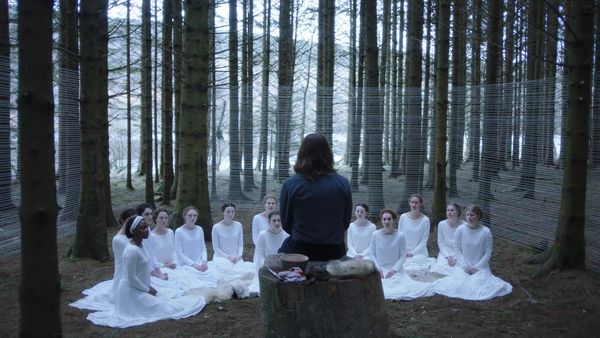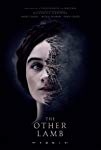Eye For Film >> Movies >> The Other Lamb (2019) Film Review
The Other Lamb
Reviewed by: Amber Wilkinson

The world of a religious cult, as viewed by the shifting perspective of Selah (Raffey Cassidy), a youngster on the cusp of menarche, is the subject of the latest film from Malgorzata Szumowska. The Polish director is no stranger to incorporating spiritual themes into her work, including Body and Mug - and here, scripted by Catherine S McMullen, faith takes a dark turn redolent of the future Dystopia of The Handmaid's Tale, but also other cult explorations like Martha Marcy May Marlene or Sound Of My Voice and the more allegorical, blood-dipped world of the likes of Angela Carter's The Company Of Wolves.
The Flock is the only world that Selah and her young friends have ever known. They are collectively referred to as daughters in their small community in an isolated woodland, run by older women, simply known as the wives. The only man in the equation, and who has doubtless sired many of the daughters, is the Shepherd (Michiel Huisman), a charismatic presence with long hair, a beard, a Christ-like demeanour - and a narcissism large enough for an unholy trinity. The Shepherd is fond of instructing his Flock to, "Accept my grace", and phrases such as being "filled with his spirit" take on a queasy feel in his presence.

The fact that we, as an audience, know from the start that this situation almost certainly doesn't bode well only makes it all the more tense as the small community comes under pressure from without and within. Szumowska may be making her first English-language feature but she is drawing on much older and more universal Christian iconography, so that sometimes the Shepherd's appearance against a steamy window almost has the appearance of the Turin Shroud or, against firelight, as a wood carving that could be hanging in a church. Fire and water's twin symbolism as deadly forces of nature or purifying powers are also explored.
The patriarchal elements of organised religion become emphasised in this world in miniature, as the Shepherd begins to take rather too much interest in his 'daughters'. When they are on their period, they are banished to the edges of the Flock with a wife now considered unclean (Denise Gough in the sort of small but significant role that is beginning to become her stock-in-trade). Selah faces a dual awakening, both to her womanhood and the reality of what is happening in the Flock. The way that Szumowska presents sexual abuse is impressive, as she shows, without voyeurism, how something that Selah first imagines to be erotic is, in fact, an act of violence.
Szumowska fills her film with turbulence, from the physical maelstrom of a waterfall seen at the start of the film to the often macabre visions experienced by Selah as she begins to wonder if there isn't more to life than what she has known. The way ahead may be a little pre-destined but the director lets the tension drip through every beautifully shot moment by cinematographer Michal Englert - with the sort of imagery that could see her film achieve its own cult appeal.
Reviewed on: 11 Oct 2019


















